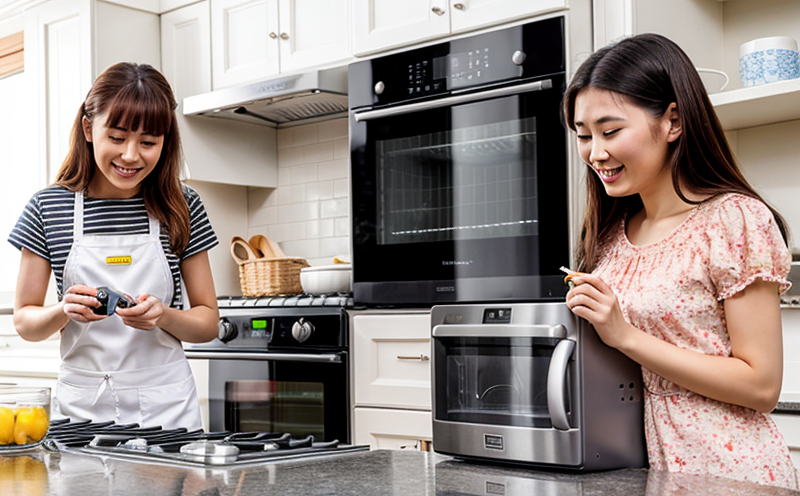EN 60704 Acoustic Testing for Household Appliances
The European standard EN 60704-11 is a cornerstone in ensuring the safety, reliability, and performance of household electrical appliances. This standard specifically addresses acoustic testing to evaluate noise levels within specified limits that are acceptable for residential environments. The aim is to minimize the impact of noise on users' health and comfort while maintaining product functionality.
Acoustic testing under EN 60704-11 involves a series of procedures designed to measure sound pressure levels (SPL) at various operational conditions. These tests are particularly critical for products like refrigerators, washing machines, dishwashers, and air conditioners, where prolonged exposure can affect users' well-being.
The testing process typically includes several steps: initial setup, specimen preparation, execution of the test protocol, data collection, and finally, analysis to ensure compliance with the standard limits. Specimen preparation involves ensuring that the appliance is in a stable state before testing begins. This ensures accurate measurement of sound levels under defined operating conditions.
Key instruments used for this testing include sound level meters (SLMs) and octave band analyzers. These devices are calibrated to meet international standards, such as IEC 61260, which ensures consistency in measurements across different laboratories. The use of these advanced tools allows for precise measurement of noise levels over a wide frequency range.
| Standard | Description |
|---|---|
| EN 60704-11 | European standard for acoustic testing of household electrical appliances. |
| IEC 61260 | International standard for sound level meters and octave band analyzers used in the measurement of noise levels. |
The testing protocol is designed to simulate real-world operating conditions, ensuring that any compliance issues are identified early in the development process. This proactive approach not only enhances product quality but also helps manufacturers meet regulatory requirements and improve consumer satisfaction.
Compliance with EN 60704-11 is crucial for brands aiming to gain market acceptance and avoid potential legal challenges. It provides a robust framework for developing products that are both safe and user-friendly, contributing significantly to the industry's reputation for quality and reliability.
In conclusion, acoustic testing under EN 60704-11 plays a vital role in ensuring that household electrical appliances meet stringent noise control requirements. By adhering to this standard, manufacturers can enhance product safety, improve user experience, and ensure compliance with international regulations.
Why It Matters
The importance of acoustic testing cannot be overstated in the context of household electrical appliances. Noise levels are a critical factor that directly impacts users' comfort and well-being. High noise levels can lead to stress, sleep disturbances, and even long-term health issues if not managed properly.
EN 60704-11 provides a standardized approach to measuring sound pressure levels in various operational modes of household appliances. This ensures that the products are designed and manufactured with acoustic considerations, leading to safer and more user-friendly devices.
The testing process is not just about meeting regulatory requirements; it also helps manufacturers improve product design by identifying potential noise sources early in the development phase. This proactive approach allows for iterative refinement of prototypes until they meet both performance criteria and acoustic standards.
Furthermore, compliance with EN 60704-11 is essential for brands looking to establish a strong market presence. Consumers are increasingly aware of the importance of noise control in household appliances, and those that fail to comply may face reputational damage and reduced sales. By adhering to this standard, manufacturers can build trust with consumers and differentiate their products in a competitive market.
In summary, acoustic testing under EN 60704-11 is not just a regulatory requirement but also a strategic decision that enhances product quality, user satisfaction, and brand reputation. It ensures that household electrical appliances are safe, reliable, and designed with consideration for the end-user's comfort.
Applied Standards
| Standard | Description |
|---|---|
| EN 60704-11 | European standard for acoustic testing of household electrical appliances. |
| IEC 61260 | International standard for sound level meters and octave band analyzers used in the measurement of noise levels. |
The application of these standards ensures that the testing process is consistent, reliable, and accurate. This consistency is crucial for maintaining high-quality products that meet international safety and performance criteria. By adhering to these standards, laboratories can provide credible test results that are recognized globally.
Quality and Reliability Assurance
Ensuring the quality and reliability of household electrical appliances through acoustic testing is a multi-step process. It begins with the selection of appropriate instruments, such as sound level meters and octave band analyzers, which are calibrated according to IEC 61260 standards.
The specimen preparation phase involves ensuring that the appliance is in its operational state before testing. This includes setting up the environment to simulate real-world conditions as closely as possible. The goal is to provide a realistic representation of how the product will perform under normal use, allowing for accurate measurement of sound pressure levels.
The execution of the test protocol involves several key steps: establishing reference points, conducting the actual measurements, and recording data. During this phase, it is essential to follow standardized procedures to ensure consistency across different tests. This includes using consistent calibration methods and adhering to standard operating procedures (SOPs).
Data analysis plays a crucial role in determining compliance with EN 60704-11 requirements. Analysts use sophisticated software tools to process the collected data, identifying any deviations from acceptable noise levels. This analysis is critical for identifying potential issues and making necessary adjustments before mass production.
By maintaining strict adherence to these processes, laboratories can ensure that their testing results are reliable and accurate. This not only enhances product quality but also builds trust with customers and regulatory bodies. Ultimately, the rigorous application of acoustic testing under EN 60704-11 contributes significantly to the overall safety and performance of household electrical appliances.





